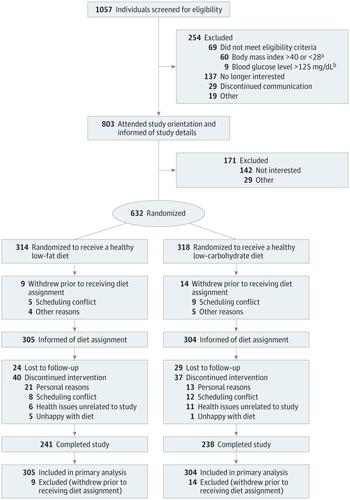Our official English website, www.x-mol.net, welcomes your
feedback! (Note: you will need to create a separate account there.)
Effect of Low-Fat vs Low-Carbohydrate Diet on 12-Month Weight Loss in Overweight Adults and the Association With Genotype Pattern or Insulin Secretion
JAMA ( IF 63.1 ) Pub Date : 2018-02-20 , DOI: 10.1001/jama.2018.0245 Christopher D Gardner 1 , John F Trepanowski 1 , Liana C Del Gobbo 1 , Michelle E Hauser 1 , Joseph Rigdon 2 , John P A Ioannidis 1, 3, 4, 5 , Manisha Desai 2, 3, 4, 5 , Abby C King 1, 3
JAMA ( IF 63.1 ) Pub Date : 2018-02-20 , DOI: 10.1001/jama.2018.0245 Christopher D Gardner 1 , John F Trepanowski 1 , Liana C Del Gobbo 1 , Michelle E Hauser 1 , Joseph Rigdon 2 , John P A Ioannidis 1, 3, 4, 5 , Manisha Desai 2, 3, 4, 5 , Abby C King 1, 3
Affiliation

|
Importance Dietary modification remains key to successful weight loss. Yet, no one dietary strategy is consistently superior to others for the general population. Previous research suggests genotype or insulin-glucose dynamics may modify the effects of diets. Objective To determine the effect of a healthy low-fat (HLF) diet vs a healthy low-carbohydrate (HLC) diet on weight change and if genotype pattern or insulin secretion are related to the dietary effects on weight loss. Design, Setting, and Participants The Diet Intervention Examining The Factors Interacting with Treatment Success (DIETFITS) randomized clinical trial included 609 adults aged 18 to 50 years without diabetes with a body mass index between 28 and 40. The trial enrollment was from January 29, 2013, through April 14, 2015; the date of final follow-up was May 16, 2016. Participants were randomized to the 12-month HLF or HLC diet. The study also tested whether 3 single-nucleotide polymorphism multilocus genotype responsiveness patterns or insulin secretion (INS-30; blood concentration of insulin 30 minutes after a glucose challenge) were associated with weight loss. Interventions Health educators delivered the behavior modification intervention to HLF (n = 305) and HLC (n = 304) participants via 22 diet-specific small group sessions administered over 12 months. The sessions focused on ways to achieve the lowest fat or carbohydrate intake that could be maintained long-term and emphasized diet quality. Main Outcomes and Measures Primary outcome was 12-month weight change and determination of whether there were significant interactions among diet type and genotype pattern, diet and insulin secretion, and diet and weight loss. Results Among 609 participants randomized (mean age, 40 [SD, 7] years; 57% women; mean body mass index, 33 [SD, 3]; 244 [40%] had a low-fat genotype; 180 [30%] had a low-carbohydrate genotype; mean baseline INS-30, 93 &mgr;IU/mL), 481 (79%) completed the trial. In the HLF vs HLC diets, respectively, the mean 12-month macronutrient distributions were 48% vs 30% for carbohydrates, 29% vs 45% for fat, and 21% vs 23% for protein. Weight change at 12 months was −5.3 kg for the HLF diet vs −6.0 kg for the HLC diet (mean between-group difference, 0.7 kg [95% CI, −0.2 to 1.6 kg]). There was no significant diet-genotype pattern interaction (P = .20) or diet-insulin secretion (INS-30) interaction (P = .47) with 12-month weight loss. There were 18 adverse events or serious adverse events that were evenly distributed across the 2 diet groups. Conclusions and Relevance In this 12-month weight loss diet study, there was no significant difference in weight change between a healthy low-fat diet vs a healthy low-carbohydrate diet, and neither genotype pattern nor baseline insulin secretion was associated with the dietary effects on weight loss. In the context of these 2 common weight loss diet approaches, neither of the 2 hypothesized predisposing factors was helpful in identifying which diet was better for whom. Trial Registration clinicaltrials.gov Identifier: NCT01826591
中文翻译:

低脂肪与低碳水化合物饮食对超重成人 12 个月体重减轻的影响以及与基因型模式或胰岛素分泌的关系
重要性 饮食调整仍然是成功减肥的关键。然而,对于一般人群,没有一种饮食策略始终优于其他饮食策略。先前的研究表明,基因型或胰岛素-葡萄糖动力学可能会改变饮食的影响。目的 确定健康低脂 (HLF) 饮食与健康低碳水化合物 (HLC) 饮食对体重变化的影响,以及基因型模式或胰岛素分泌是否与饮食对体重减轻的影响有关。设计、设置和参与者 饮食干预检查与治疗成功相互作用的因素 (DIETFITS) 随机临床试验包括 609 名 18 至 50 岁无糖尿病、体重指数在 28 至 40 之间的成年人。试验招募是从 1 月 29 2013 年,至 2015 年 4 月 14 日;末次随访日期为2016年5月16日。参与者被随机分配到 12 个月的 HLF 或 HLC 饮食。该研究还测试了 3 个单核苷酸多态性多位点基因型反应模式或胰岛素分泌(INS-30;葡萄糖激发后 30 分钟的血胰岛素浓度)是否与体重减轻有关。干预 健康教育者通过 12 个月内管理的 22 次特定饮食小组会议向 HLF(n = 305)和 HLC(n = 304)参与者提供行为矫正干预。会议的重点是实现可以长期保持的最低脂肪或碳水化合物摄入量的方法,并强调饮食质量。主要结果和测量主要结果是 12 个月的体重变化以及确定饮食类型和基因型模式、饮食和胰岛素分泌之间是否存在显着相互作用,以及饮食和减肥。结果 在随机分配的 609 名参与者中(平均年龄,40 [SD,7] 岁;57% 为女性;平均体重指数,33 [SD,3];244 [40%] 名具有低脂肪基因型;180 [30%] 名)具有低碳水化合物基因型;平均基线 INS-30,93 &mgr;IU/mL),481 (79%) 完成了试验。在 HLF 与 HLC 饮食中,碳水化合物的平均 12 个月常量营养素分布分别为 48% 与 30%,脂肪为 29% 与 45%,蛋白质为 21% 与 23%。HLF 饮食在 12 个月时的体重变化为 -5.3 kg,而 HLC 饮食为 -6.0 kg(平均组间差异,0.7 kg [95% CI,-0.2 至 1.6 kg])。12 个月体重减轻没有显着的饮食-基因型模式相互作用 (P = .20) 或饮食-胰岛素分泌 (INS-30) 相互作用 (P = .47)。有 18 起不良事件或严重不良事件均匀分布在 2 个饮食组中。结论和相关性 在这项为期 12 个月的减肥饮食研究中,健康低脂饮食与健康低碳水化合物饮食之间的体重变化没有显着差异,基因型模式和基线胰岛素分泌均与饮食影响无关关于减肥。在这两种常见的减肥饮食方法的背景下,两种假设的诱发因素都无助于确定哪种饮食更适合谁。试验注册clinicaltrials.gov 标识符:NCT01826591 基因型模式和基线胰岛素分泌均与饮食对体重减轻的影响无关。在这两种常见的减肥饮食方法的背景下,两种假设的诱发因素都无助于确定哪种饮食更适合谁。试验注册clinicaltrials.gov 标识符:NCT01826591 基因型模式和基线胰岛素分泌均与饮食对体重减轻的影响无关。在这两种常见的减肥饮食方法的背景下,两种假设的诱发因素都无助于确定哪种饮食更适合谁。试验注册clinicaltrials.gov 标识符:NCT01826591
更新日期:2018-02-20
中文翻译:

低脂肪与低碳水化合物饮食对超重成人 12 个月体重减轻的影响以及与基因型模式或胰岛素分泌的关系
重要性 饮食调整仍然是成功减肥的关键。然而,对于一般人群,没有一种饮食策略始终优于其他饮食策略。先前的研究表明,基因型或胰岛素-葡萄糖动力学可能会改变饮食的影响。目的 确定健康低脂 (HLF) 饮食与健康低碳水化合物 (HLC) 饮食对体重变化的影响,以及基因型模式或胰岛素分泌是否与饮食对体重减轻的影响有关。设计、设置和参与者 饮食干预检查与治疗成功相互作用的因素 (DIETFITS) 随机临床试验包括 609 名 18 至 50 岁无糖尿病、体重指数在 28 至 40 之间的成年人。试验招募是从 1 月 29 2013 年,至 2015 年 4 月 14 日;末次随访日期为2016年5月16日。参与者被随机分配到 12 个月的 HLF 或 HLC 饮食。该研究还测试了 3 个单核苷酸多态性多位点基因型反应模式或胰岛素分泌(INS-30;葡萄糖激发后 30 分钟的血胰岛素浓度)是否与体重减轻有关。干预 健康教育者通过 12 个月内管理的 22 次特定饮食小组会议向 HLF(n = 305)和 HLC(n = 304)参与者提供行为矫正干预。会议的重点是实现可以长期保持的最低脂肪或碳水化合物摄入量的方法,并强调饮食质量。主要结果和测量主要结果是 12 个月的体重变化以及确定饮食类型和基因型模式、饮食和胰岛素分泌之间是否存在显着相互作用,以及饮食和减肥。结果 在随机分配的 609 名参与者中(平均年龄,40 [SD,7] 岁;57% 为女性;平均体重指数,33 [SD,3];244 [40%] 名具有低脂肪基因型;180 [30%] 名)具有低碳水化合物基因型;平均基线 INS-30,93 &mgr;IU/mL),481 (79%) 完成了试验。在 HLF 与 HLC 饮食中,碳水化合物的平均 12 个月常量营养素分布分别为 48% 与 30%,脂肪为 29% 与 45%,蛋白质为 21% 与 23%。HLF 饮食在 12 个月时的体重变化为 -5.3 kg,而 HLC 饮食为 -6.0 kg(平均组间差异,0.7 kg [95% CI,-0.2 至 1.6 kg])。12 个月体重减轻没有显着的饮食-基因型模式相互作用 (P = .20) 或饮食-胰岛素分泌 (INS-30) 相互作用 (P = .47)。有 18 起不良事件或严重不良事件均匀分布在 2 个饮食组中。结论和相关性 在这项为期 12 个月的减肥饮食研究中,健康低脂饮食与健康低碳水化合物饮食之间的体重变化没有显着差异,基因型模式和基线胰岛素分泌均与饮食影响无关关于减肥。在这两种常见的减肥饮食方法的背景下,两种假设的诱发因素都无助于确定哪种饮食更适合谁。试验注册clinicaltrials.gov 标识符:NCT01826591 基因型模式和基线胰岛素分泌均与饮食对体重减轻的影响无关。在这两种常见的减肥饮食方法的背景下,两种假设的诱发因素都无助于确定哪种饮食更适合谁。试验注册clinicaltrials.gov 标识符:NCT01826591 基因型模式和基线胰岛素分泌均与饮食对体重减轻的影响无关。在这两种常见的减肥饮食方法的背景下,两种假设的诱发因素都无助于确定哪种饮食更适合谁。试验注册clinicaltrials.gov 标识符:NCT01826591











































 京公网安备 11010802027423号
京公网安备 11010802027423号